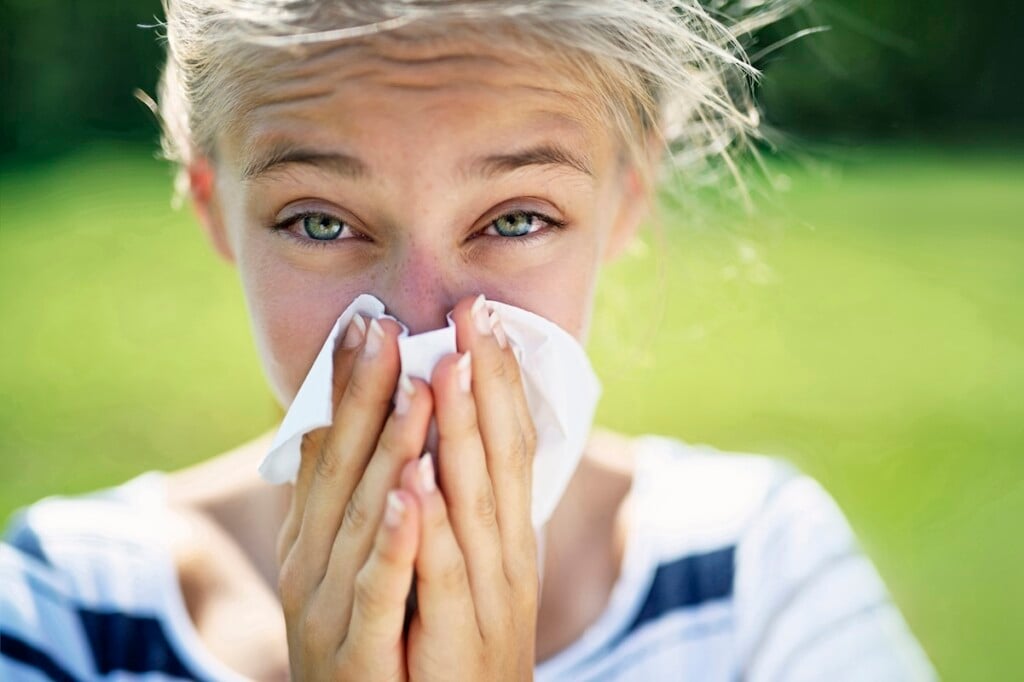Nothing To Sneeze At
When the high pollen count has you reaching for relief, here's what works - and what doesn't.

The onset of spring should be an exciting time. The days are longer, the snow is melting and we’re all looking forward to throwing open some windows and letting the air in. But for many Americans the warming trend of these days also means that seasonal allergies are on the march. According to the Allergy and Asthma Foundation of America, as of 2021, 26 percent of adults and 19 percent of children had been diagnosed with seasonal allergies.
Coughing, sneezing, itchy and runny eyes, a tight chest, a sinus headache—these symptoms may seem mundane, but they can be debilitating when they become chronic. “The patients we see are sick,” says Leonard Silverstein, M.D., an allergist in Saddle River. “Their allergies are stopping them from going about their daily lives, and the medicine they’re picking up over the counter isn’t helping.”
Jeffrey Weiss, M.D., an allergist in Paramus, adds: “There is no ‘one size fits all’ for treating seasonal allergies. Treatment is based on the severity of one’s symptoms. Depending on how much of a negative impact those symptoms are having on someone’s quality of life, the level of his or her treatment changes.”
Looking for seasonal-allergy relief? BERGEN sat down with Dr. Silverstein and Dr. Weiss to discuss some facts, some common misconceptions and some advice on what works:
Can nasal irrigation help? Saline sprays or nasal irrigation, which you may know as a neti pot, can be a good immediate first step to make yourself feel better. It’s a way for you to flush out your sinuses at home, both to remove the irritating allergen and to soothe in the short term. “It definitely soothes the nasal tissues, which get inflamed,” says Dr. Silverstein. “It can also shrink those tissues and help the patient breathe. It’s always nice to remove the irritant, and that can remove the allergen from inside the nose itself. However, it is a low form of intervention.”
Is local honey an option? There’s some indication that eating honey, a popular at-home treatment, can introduce pollen allergens into your system and help you build up an immunity to them over time. It’s not a bad theory; Dr. Weiss says that this treatment can “result in mild improvement in some patients.”
“Traditional allergy injections place the allergen under the skin,” Dr. Silverstein explains. “That’s called immunotherapy, and it is designed to teach a body that is overreacting to an allergen to ignore it instead. Local honey would be a form of oral immunotherapy, which is being used more in Europe than it is in the United States. It certainly can’t do any harm.”
Will increasing probiotics give relief? What about Vitamin C? Recent studies have suggested that a heathy microbiome in the intestinal tract can lower the risk of allergies in general. “Overall health is important, as probiotics help the microbiome in the intestinal tract,” says Dr. Weiss, though he adds that increasing these probiotics during the spring pollen season “will likely not diminish one’s symptoms.” He offers a similar answer about Vitamin C, which is known for its anti-inflammatory effects, saying, “Vitamin C helps prevent inflammation, but it is not recommended by allergists as a specific treatment for seasonal allergies.”
Can you predict the allergy season? In this area, seasonal allergies are at their worst when the oak trees release their pollen. That’s why you and your family members (and maybe everyone you know) start having symptoms at the same time. It tends to be a two- or three-week period, often the last two weeks of April or the first two weeks of May, but the exact time and severity depend on the weather going on around it, which is what makes it so difficult to predict precisely. “The severity of the season is based on two factors,” says Dr. Silverstein. “One is the temperature when those oaks open up. The other is whether or not it’s raining. If it’s 80 degrees, that’s when you see a ‘pollen bomb.’ You walk outside and everything is green, you see it stuck to everything. If the temperature is cool and it’s raining, that’s good. The pollen levels go down. But if it’s dry and hot, that’s trouble.”
Though he has stopped trying to predict the severity of each allergy season, Dr. Silverstein encourages those with severe seasonal allergies to seek out a doctor in March, before the height of the season, and plan for it. Medications sometimes need adjusting for the peak of the season. “You can anticipate that symptoms are going to happen, and you can prepare people,” he says.
Is there a cure for seasonal allergies? Allergies are one of the most common chronic conditions in the United States, but Dr. Silverstein says there is hope for those looking to ditch their symptoms for good. Allergy shots (immunotherapy) are very appealing to people for this reason. “They are really quite effective,” says Silverstein. “They are curative. You see an improvement after two months of injections, and then you continue on them for three to five years. After that, you continue to see improvement even after you discontinue the shots.”
Dr. Weiss echoes that sentiment, adding that the shots “minimize or eliminate a patient’s need for other medications.” He adds that, above all, treatment for seasonal allergies should be the topic of a joint conversation and decision between a patient and his or her doctor. Not every treatment is right for every person.
More than anything, Dr. Silverstein stresses that patients don’t have to suffer. Some lifestyle changes can ease symptoms in the short term—for instance, staying inside and within air-conditioned environments during the height of pollen season, or taking frequent showers. There are long-term solutions as well, and the treatments currently available are effective. He also stresses that, if your allergies are making you wheeze, you should seek a medical professional right away.
“These problems are very treatable,” he says. “Sometimes, people try to be stoic about seasonal allergies, and they’ll just power through it and deal with their symptoms. Of course you can deal with your symptoms. But it’s very uncomfortable, and it truly isn’t necessary.”

